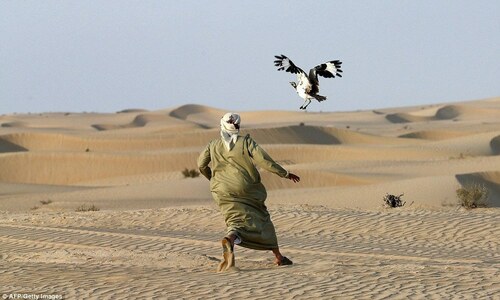KARACHI: In what appears to be an effort to appease influential quarters, the Sindh government has allowed falconry and trophy hunting this year, ignoring the devastation caused by floods to the wildlife population, it emerged on Thursday.
According to a notification, the hunting season of (native) game birds and water fowls would remain closed for the season 2022-23 on the grounds of natural calamity.
The closure would be applied to all areas including privately owned hunting reserves so registered under the wildlife laws.
“However, other forms of hunting such as trophy hunting and falconry shall not be under the scope of the orders on the grounds of non-occurrence of natural calamity in such areas at deserts and foot hills of the province,” the Oct 27 notification issued by the forest and wildlife department says.
Govt under immense pressure not to slap a complete ban, say officials
It may be recalled that the provincial cabinet in a recent meeting had decided to ban hunting of native game birds and migratory waterfowls for a year “until the wildlife gets recovered from the shock sustained due to natural disaster.”
However, there was no mention to the widely criticised falconry organised for Arab hunters and trophy hunting.
When contacted, Sindh conservator Javed Ahmed Mahar said the floods had largely affected the fertile plain areas of the province where hunting had been banned.
“The government has allowed falconry and trophy hunting in non-protected hilly and desert areas, which have remained safe from the disaster,” he explained, adding that 80 per cent of the proceeds from trophy hunting went to the community.
About the loss of wildlife and their habitats in floods, he said flooding along the river belt heavily affected both human and animal life. “All forms of animal life especially reptiles, rodents and insects as well as flora were amongst the worst sufferers. Majority of the recently hatched brood faced mortality, though surviving birds took refuge at scattered dry pieces of land and trees.”
According to Mr Mahar, the government has banned hunting of water fowls as they were expected to land all around due to water, contrary to their traditional sites, attracting masses to avail shooting opportunity and posing a threat not only to migratory water fowls but also to people that have taken refuge in relief camps.
Saeed-ul-Islam of the World Wildlife Fund for Nature agreed with the argument on trophy hunting. “It’s conducted in hilly areas that have remained safe from the devastation. Besides, communities benefit from the activity targeting old male animals,” he said, while declining to comment on falconry, reasoning that he was not aware of current data on the population of migratory birds.
Speaking to Dawn on condition of anonymity, wildlife officials stated that the government was under immense pressure not to slap a complete ban on hunting.
“There were written requests from influential quarters to allow hunting. Hence, the government was in no position to take this drastic step,” an official said, adding that wildlife could not be restricted to one area as they migrated due to different reasons including threat to life.
“Hence, the logic behind the permission makes little sense.”
According to the notification, the wildlife department will carry out a survey by engaging the field staff of their divisions and submit a report to the extent of breeding, sightings and stability of wildlife population once the floods recede to enable the department for taking decision regarding hunting season 2023-24.
Published in Dawn, October 28th, 2022











































